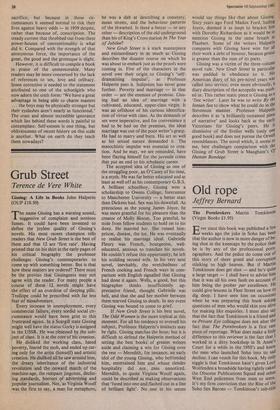Grub Street
Terence de Vere White
The name Gissing has a warning sound, suggestive of complaint and noxious fumes. It could have been invented to define the joyless quality of Gissing's novels. His most recent champion tells readers that New Grub Street is the best of them and that 12 are 'first rate'. Having printed that on his shirt in the early pages of his critical biography the professor challenges Gissing's contemporaries to come up with something better. But is that how these matters are ordered? There must be the proviso that Gissingness may not agree with the reader. For many people a course of those 12 novels might have the effect of an overdose of sleeping pills. Trollope could be prescribed with far less fear of misadventure.
Every increase in unemployment, every commercial failure, every sordid social cir- cumstance would have been grist to this frustrated egoist. In a Scargill state Gissing might well have the status Gorky is assigned in the USSR. He was obsessed by the sub- ject of class. It is at the core of his creation.
He disliked the working class, hated poverty, feared the mob, and ended up car- ing only for the artist (himself) and artistic creation. He disliked all he saw around him, the dreary inheritance of the industrial revolution and the onward march of the machine-age, the rampant jingoism, declin- ing standards, horrors of advertising and popular journalism. Not, as Virginia Woolf was the first to say, a man for metaphors,
he was a dab at describing a cemetery, mean streets, and the behaviour patterns of the thwarted. Is there a better — or any other — description of the old underground than his of King's Cross station In The Year of Jubilee?
New Grub Street is a stark masterpiece and extraordinary in as much as Gissing describes the disaster course on which he was about to embark just as the proofs were coming in. Five of the characters in the novel owe their origin to Gissing's 'self- dramatising impulse', as Professor Halperin puts it. Solipsism has never gone further. Poverty and marriage — in that order — are the enemies of promise. Giss- ing had an idea of marriage with a cultivated, educated, upper-class virgin. It was an offshoot of his curious identifica- tion of virtue with class. As the demands of sex were imperative, and for convenience it had to be had on the premises, the ideal marriage was out of the poor writer's grasp. He had to marry and burn. His art as well as his sexual nature demanded it. The masochistic impulse was essential to crea- tion. And he may, we are reminded, have been flaying himself for the juvenile crime that put an end to his scholastic career.
The accepted idea of Gissing as one of the struggling poor, an O'Casey of his time, is a myth. He was far better educated and at least as well off as his contemporary G.B.S. A brilliant schoolboy, Gissing won a scholarship to Owens College, forerunner to Manchester University — a better start than Dickens had. Sex was his downfall. As precocious as the young James Joyce, he was more grateful for his pleasure than the creator of Molly Bloom. Too grateful, he stole from fellow students to hold on to his doxy. He married her. She ruined him: prison, disease, the lot. He was eventually to realise his marriage ideal. Gabrielle Fleury was French, bourgeoise, well- educated, anxious to translate his novels. He couldn't refuse this opportunity; he left his scolding second wife. In his very next novel, inevitably, the wretchedness of French cooking and French ways in com- parison with English signalled that Gissing had done it again. Wells, a good, but this biographer thinks insufficiently ap- preciative friend, thought Gabrielle was hell, and that she and her mother between them starved Gissing to death. In any event Gissing was bound to come to grief.
If New Grub Street is his best novel, The Odd Women is the more topical at this moment. For all his tendency to oversell his subject, Professor Halperin's instincts may be right. Gissing matches the hour; but it is difficult to defend the Halperin method of setting the best books of greater writers aside and claiming a win for Gissing over the rest — Meredith, for instance, an early idol of the young Gissing, who befriended him, entertained him and whose slender hospitality did not pass unnoticed. Meredith, to quote Virginia Woolf again, could be described as making observations that 'fused into one and flashed out in a line of brilliant light'. No one in his senses
would say things like that about Gissing. Sixty years ago Ford Madox Ford, hailing Joyce, deemed it as inept to bracket him with Dorothy Richardson as it would be to mention Gissing in the same breath as Flaubert. Some of the writers Halperin compares with Gissing have won for all their work a debt of honour, because genius is greater than the sum of its parts.
Gissing was a victim of the three-volume novel rule. New Grub Street in particular was padded in obedience to it. His American diary of his pre-novel years was called into service; even more obviously, a diary description of the acropolis was push- ed in. This rather static piece is Gissing as a 'fine writer'. Later he was to write By the Ionian Sea to show what he could do in the Stevenson manner. Professor Halperin describes it as 'a brilliantly sustained piece of narrative' and looks back at the earlY Victorians for Gissing's peers. He is dismissive of the livelier wells (only one good book) and does not pursue the Orwell resemblances. The novel which, it seems to me, best challenges comparison with the Gissing of Grub Street is Maugham's Of Human Bondage.


































 Previous page
Previous page